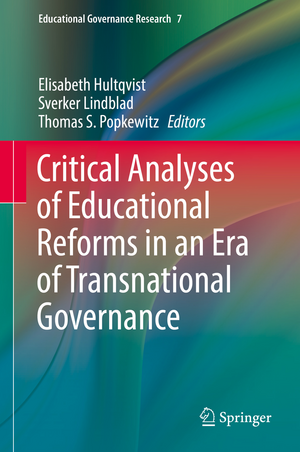Critical Analyses of Educational Reforms in an Era of Transnational Governance: Educational Governance Research, cartea 7
Editat de Elisabeth Hultqvist, Sverker Lindblad, Thomas S. Popkewitzen Limba Engleză Hardback – 2 noi 2017
| Toate formatele și edițiile | Preț | Express |
|---|---|---|
| Paperback (1) | 585.22 lei 38-44 zile | |
| Springer International Publishing – 28 aug 2018 | 585.22 lei 38-44 zile | |
| Hardback (1) | 703.06 lei 6-8 săpt. | |
| Springer International Publishing – 2 noi 2017 | 703.06 lei 6-8 săpt. |
Din seria Educational Governance Research
- 24%
 Preț: 680.66 lei
Preț: 680.66 lei - 20%
 Preț: 553.85 lei
Preț: 553.85 lei -
 Preț: 304.59 lei
Preț: 304.59 lei - 18%
 Preț: 941.05 lei
Preț: 941.05 lei - 24%
 Preț: 749.04 lei
Preț: 749.04 lei -
 Preț: 305.98 lei
Preț: 305.98 lei - 18%
 Preț: 732.70 lei
Preț: 732.70 lei - 18%
 Preț: 892.90 lei
Preț: 892.90 lei - 15%
 Preț: 641.38 lei
Preț: 641.38 lei -
 Preț: 389.88 lei
Preț: 389.88 lei - 18%
 Preț: 947.85 lei
Preț: 947.85 lei -
 Preț: 379.48 lei
Preț: 379.48 lei - 18%
 Preț: 1006.24 lei
Preț: 1006.24 lei - 18%
 Preț: 785.86 lei
Preț: 785.86 lei - 24%
 Preț: 832.93 lei
Preț: 832.93 lei - 24%
 Preț: 682.78 lei
Preț: 682.78 lei - 15%
 Preț: 637.59 lei
Preț: 637.59 lei - 15%
 Preț: 649.54 lei
Preț: 649.54 lei -
 Preț: 392.97 lei
Preț: 392.97 lei -
 Preț: 388.52 lei
Preț: 388.52 lei -
 Preț: 440.39 lei
Preț: 440.39 lei - 15%
 Preț: 700.94 lei
Preț: 700.94 lei - 15%
 Preț: 587.53 lei
Preț: 587.53 lei
Preț: 703.06 lei
Preț vechi: 827.13 lei
-15% Nou
Puncte Express: 1055
Preț estimativ în valută:
134.54€ • 141.11$ • 111.99£
134.54€ • 141.11$ • 111.99£
Carte tipărită la comandă
Livrare economică 01-15 aprilie
Preluare comenzi: 021 569.72.76
Specificații
ISBN-13: 9783319619699
ISBN-10: 3319619691
Pagini: 276
Ilustrații: XI, 280 p. 4 illus.
Dimensiuni: 155 x 235 mm
Greutate: 0.59 kg
Ediția:1st ed. 2018
Editura: Springer International Publishing
Colecția Springer
Seria Educational Governance Research
Locul publicării:Cham, Switzerland
ISBN-10: 3319619691
Pagini: 276
Ilustrații: XI, 280 p. 4 illus.
Dimensiuni: 155 x 235 mm
Greutate: 0.59 kg
Ediția:1st ed. 2018
Editura: Springer International Publishing
Colecția Springer
Seria Educational Governance Research
Locul publicării:Cham, Switzerland
Cuprins
1. Introduction: Critical Analyses of Educational Reforms in an Era of Transnational Governance; Elisabeth Hultqvist, Sverker Lindblad, Thomas S. Popkewitz.- First section: Studies of transnational governance of education.- 2. Narrating and relating educational reform and Comparative Education; Robert Cowen.- 3. Reforming Education: The Spaces and Places of Education Policy and Learning; Bob Lingard.- Second section: Educational reforms and transnationalization.- 4. Education Governance by Results? On communication in a performative turn in Swedish Education; Sverker Lindblad.- 5. Educational restructuring and social boundaries – School choices and consumers of education; Elisabeth Hultqvist.- 6. Becoming Fit For Transnational Comparability. Exploring challenges in Danish and Swedish teacher education reforms; John Benedicto Krejsler, Ulf Olsson and Kenneth Petersson.- 7. Killing two birds with one stone: Globalizing Switzerland by Harmonizing the Cantonal Systems of Education in the Aftermath of PISA; Daniel Tröhler.- Third section: Making Kinds of People as the Imperatives of education: The practice of Governing the Educational Subjects.- 8. Reform and Making Human Kinds: The Double Gestures of Inclusion and Exclusion in the Practice of Schooling; Thomas S. Popkewitz.- 9. The transnational phenomenon of individual planning in response to pupil diversity: a paradox in educational reform; Ines Alves.- 10. Re-figuring the European student: Mixed transnational feelings; Maarten Simons.- 11. Student Centeredness and Learning from a Perspective of History of the Present; Ulf Olsson, Kenneth Petersson and John Benedicto Krejsler.- 12. Governing the intermediary spaces. Reforming school and subjectivities through liminal motivational technologies; Helle Bjerg and Dorthe Staunæs.- 13. Digital Technologies in the Classroom: A global educational reform?; Ines Dussel.- Fourth section: Migration and population flows.- 14. When the Other Arrives at School; Fernando Hernández-Hernández and Juana M. Sancho-Gil.- 15. A Manifestación to Disinvent Mundus’ Authoritarian Regimes and The Categorial Imperative of Hospitality; Ligia Lopez Lopez.- 16. Migration as a method: Deterritorializing the “floating children” in contemporary China; Lei Zheng.
Textul de pe ultima copertă
This book represents a set of critical analyses of educational reforms where issues of transnational governance are of vital concern. It focuses on different aspects of, and practices in educational reform-making, and in particular on governing techniques and the working of new agencies such as supranational and multinational organizations. In addition, the book examines contemporary issues of immigration/immigrants in the politics of schooling, by reflecting on matters of migration, and problematizing how concepts such as exclusion and abjection make the migrants appear “failed”, “insufficient” and even “dangerous”.The book provides theoretical insights into critical relations between knowledge and power, governance and governmentality, and notions concerning educational systems, as well as how these are compared. The central themes of the book are models for organizing and reflecting on transnationalization and educational reforms. In its discussion of those themes, the focus lies on changing conceptions of education and the educational system; on how school or teacher education is adapting to discourses of effectiveness and efficiency; and on their transformation according to standardized templates. Such changing conceptions define the meanings of education and educational progress; they are important for the identification and analysis of educational knowledge, and for critical discourses on education in society.
Caracteristici
Offers a critical analysis of educational reforms, transnationalization, and transnational governance Focuses on questions that often go unnoticed in studies of educational change and its politics Explores how governing has changed through more explicit international agencies and technologies of measurement
